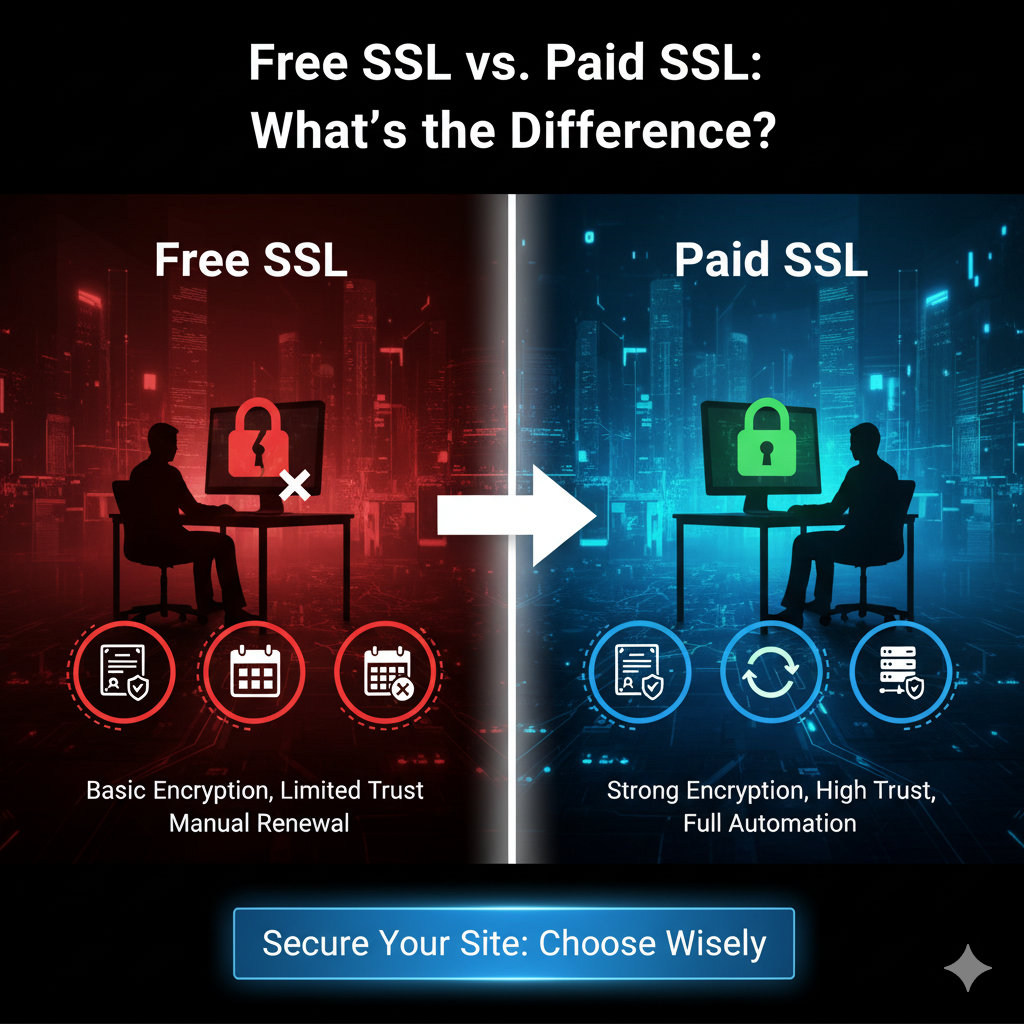SSL certificates are essential for any website. They encrypt sensitive data, improve SEO rankings, and build trust with visitors. But when choosing SSL, one common question arises: Should you use a free SSL certificate or invest in a paid one?
This guide breaks down the key differences to help you choose the best option for your business.
-
Encryption – No Major Difference
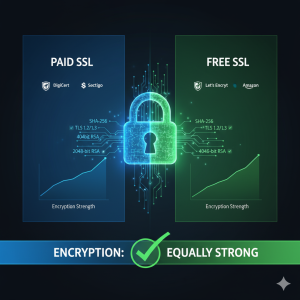
Both free and paid SSL certificates use the same encryption standards, such as SHA-256 and TLS 1.2/1.3, with 2048-bit or even 4096-bit RSA keys. Whether you use a free SSL from Let’s Encrypt, Cloudflare, or Amazon, or a paid one from Sectigo, DigiCert, RapidSSL, or GeoTrust, the level of encryption is equally strong.
-
Validation – Where Paid SSL Shines
Encryption is only part of SSL’s purpose. Validation proves the identity behind a website, and here’s where free and paid SSL differ greatly:
-
Free SSL:
Offers only Domain Validation (DV), which simply confirms domain ownership. It’s quick and easy but doesn’t verify the organization behind the site.
-
Paid SSL:
Offers Domain Validation (DV), Organization Validation (OV), and Extended Validation (EV). OV and EV certificates verify your business identity, boost credibility, and display your company name in the browser — vital for e-commerce and corporate sites.
-
Best Use Cases
-
Free SSL:
Great for small websites, personal blogs, portfolios, or informational pages that don’t process payments or sensitive data.
-
Paid SSL:
Recommended for online stores, financial platforms, enterprises, and regulated industries where user trust and legal compliance are critical.
-
Support and Reliability
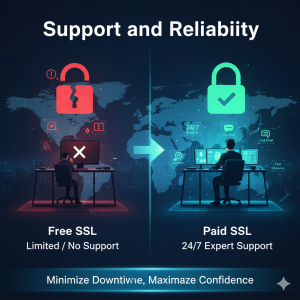
Free SSL providers usually don’t offer dedicated customer support. If something goes wrong, solving it quickly may be difficult.
Paid SSL certificates typically include 24/7 expert support from the Certificate Authority (CA) or vendor. Fast response times are crucial for minimizing security risks and downtime.
-
Availability and Geo-Restrictions
Some free SSL certificates, like those from Amazon, are limited to certain regions or specific platforms (e.g., AWS or CloudFront). They might not work if you use other hosting services.
Paid SSL certificates have global availability and can be installed on virtually any server or hosting provider, giving you maximum flexibility.
-
Ownership and Portability
Paid SSL certificates belong to you. You can install them on any server or migrate them when switching hosting providers.
Free SSLs, however, are often tied to specific platforms. For example, Cloudflare’s free SSL is installed on their edge servers, not on your origin server. If you leave their platform, the certificate becomes invalid.
-
Browser Compatibility
Paid SSL certificates are compatible with 99.9% of browsers and devices, including older versions. They also work seamlessly with mobile browsers, email clients, and VPNs.
Free SSLs usually support major browsers but can be less reliable on legacy systems or older mobile devices. Installation on certain platforms might also require more technical knowledge.
-
Extra Security Features
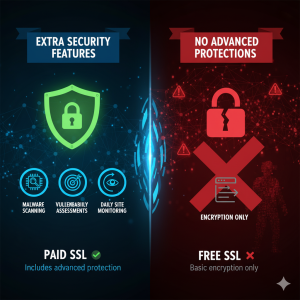
Paid SSL certificates often include advanced security features like malware scanning, vulnerability assessments, and daily site monitoring. These help prevent cyberattacks and keep your site secure.
Free SSL certificates focus solely on encryption and don’t provide these additional protections.
-
Validity Period and Renewal
-
Free SSL:
Valid for only 90 days, requiring frequent renewals. While automation is possible, it’s not always supported on every server.
-
Paid SSL:
Valid for 1 year and often available as multi-year plans. Longer validity reduces maintenance tasks and the risk of downtime.
-
Warranty Protection
Paid SSL certificates come with a warranty — ranging from thousands to over a million dollars — that compensates users in case of data breaches or certificate mis-issuance.
Free SSLs do not offer any warranty, leaving you financially unprotected in the event of a security incident.
Security Risks of Free SSL
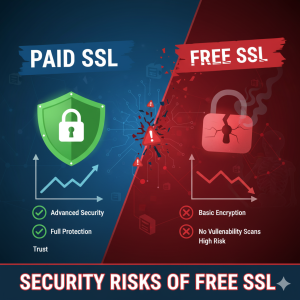
While free SSL certificates are secure, they are sometimes abused by cybercriminals. Hackers have used them to make phishing websites appear legitimate, exploiting the trust users place in the HTTPS padlock. Because free SSLs lack strict validation, detecting and preventing these attacks can be challenging.
Which One Should You Choose?
- Choose Free SSL if you run a small personal site, blog, or portfolio and don’t collect sensitive data.
- Choose Paid SSL if your business relies on customer trust, processes payments, or handles sensitive information. Paid SSL certificates from trusted brands like Sectigo, DigiCert, RapidSSL, and GeoTrust offer stronger validation, broader compatibility, better support, warranties, and enhanced security features.
In short, free SSL is a good starting point — but for any serious business, paid SSL is the smarter long-term investment. It not only secures your site but also strengthens your credibility, protects your users, and builds lasting trust. Ready to choose the right SSL for your website? Explore trusted SSL solutions tailored for your business at 👉 www.sslmalaysia.com.my

